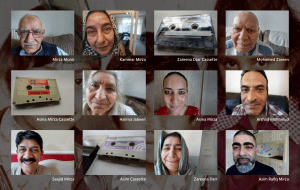
M Of The Southern Downpours: Alton Melvar M. Dapanas’ Evocative Poetry Collection Explores Queerness

Hailing from the southern Philippines, Alton Melvar M. Dapanas is a poet, essayist, and translator. M of the Southern Downpours (2024) is their third book and second collection of prose poems. It follows closely in the footsteps of In the Name of the Body: Lyric Essays (2023) and Towards a Theory on City Boys: Prose Poems (2021).
It is a slim collection, consisting of 60 pages and 19 poems. Dapanas evocatively explores queerness against the backdrop of southern Philippine cityscapes, amplifying the dailiness of queer lives, while highlighting how people live, love, and long in the city.
Dapanas prefaces M of the Southern Downpours with a short essay on the prose poem as a form and muses on its characteristics and history. Both the subject of the essay and its title, “‘Poetry Beyond Verse’: Ruminations on the Prose Poem,” take from a 2010 lecture by Charles Simic (“Essay on the Prose Poem”) who was a celebrated practitioner of the genre with one of his books being credited as having been the first collection of prose poetry to win the Pulitzer.
Written after Solmaz Sharif’s “The Near Transitive Properties of the Political and Poetical: Erasure”, this introductory essay establishes Dapanas’s intertextual approach to writing from the get-go, populated as it is with quotes and references from various authors and their works like Kazim Ali, Conchitina Cruz, and Nick Admussen, among others. Richard Siken—whose first book of poems, Crush (2005), has a huge cult following, especially in queer circles—is a frequent interlocutor who is both referred to by name as well as quoted and reworked extensively across M of the Southern Downpours.
Even as they engage with the existing canon, Dapanas creates a new one that is more diffuse, de-centered, and freshly contemporary. This playfulness is exercised in two different ways. One is abandoning the white male European literary tradition as Dapanas frequently brings writers who trace their origin to the global south. The second is by abandoning any hierarchies of citation. Taylor Swift is treated as an accomplished singer-songwriter in her own right and she sits quite comfortably next to Mary Oliver, Jody Chan, and Donika Kelly in these poems.
Absence is the framing device, and M of the Southern Downpours can be read as a collection of poems written and arranged around a void, a missing center that directs the course of both the collection and its poet persona’s life. Dapanas invokes this absence right from the beginning. The collection addresses M, an elusive ex-lover whose memories continue to burn strongly within the poet persona. Four epigraphs further establish this all-consuming relationship, outlining the shadow cast by the past.
The one from Louise Glück, which later figures in a poem as well, is especially pertinent: “You live in me. Malignant.” It is a love that metastasizes, spreads, and invades. It transforms the speaker completely. So many poems in this collection seem to hang on to barely buried history, dwelling on bygone days from the lonely vantage point of the present.
Geography is an important aspect of Dapanas’s poetry, a sense of time and place deeply tied to the Philippines and its landscapes. Poems evoke it through explicitly stated locations at their start or bring it to the fore through specific markers—from street names to particular routes to shops—scattered throughout the text. Cagayan de Oro City, situated in the southern region of the archipelagic country, is the most prominent and its urban locales feature frequently in M of the Southern Downpours.
“M in Three Acts: Prologue”, travels streetscapes, from a hotel to a bakery to a bar, as the speaker recounts their time with M and how they tie into those spots. The place becomes a marker for the person, a remembrance: “A redemptive arc doesn’t apply to me. But know there is some truth to that: I mask people as places. So when I say city, I mean you, always you.”
Yearning suffuses every page as the poet persona reminisces about old encounters and forgotten intimacies, public and private, melding the surreal with the mundane. M acts as a catalyst for and recipient of abstract thought: “Now I know, daylight, like a yearning for skin, or a song, is free, like a sin offering.” At the same time, M frequently affects the regular day: “Somewhere between waking and sleep, I check the compatibility of our Greek zodiac signs, our MBTI personality types. I hit replay on your second most played song on Spotify.”
But M is out of reach—no matter the scenarios conjured by the poet persona’s mind. The latter is almost an observer, looking in from the outside. In another poem, they confess: “You see, I desire strangers with parts of you: a porn actor with your body build, an anonymous Grindr user with your name, a passenger on the jeepney wearing your shoes, a mutual whose tweets I read in your voice, someone on Tinder in your favorite shirt.”
The pinnacle of M of the Southern Downpours is “Catalog of City Boys with Common Names”, a sequence of formally fascinating poems towards the end. Each one has a name as its title, the so-called city boys, and is tagged to a particular location. The actual text of the poems is entirely in the footnotes while the main “body” of the page is just white space.
By doing this, Dapanas literally draws attention away from the center to the periphery and privileges a typographic space for featuring asides and comments that would otherwise detract from the main text. Since the poems about these lovers unfurl in the footnotes, they are seen as footnotes in the poet’s own history. The bittersweet memories still linger on but these men are just specters of the past with no sense of the present.
While a frank exploration of queer desire and body politics is omnipresent in M of the Southern Downpours, one sees a sustained engagement with it in “Catalog of City Boys”. These poems are candid confessionals where the raw fabric of queer life is laid bare: the love, the lust, the longing. The interplay of bodies briefly brought together, a spark in the dark. The connections that endure and the ones that fade away.
In “Joey”: “This is, what’s left of you, in me: two lubed fingers, now three, then huge dick, all your inquiry into the body.” In “Marc”: “Named after the Roman god of war, his natal chart’s ruling planet, he might just be the storm-safe of my homestretch. But we’re not compatible: he loves to take so much space, I obsess over control.”
In “Jess”: “While he fatherly cradles me in his arms, Madonna sings and twirls in my head. And he’s an ideal fuck buddy because I will never see him that way.” In “Anthony”: “Letting loose, as if there is no tomorrow. And literally, there won’t be. He’s getting married. You’re moving out of town.” These are tender, poignant snapshots.
Dapanas seeks to chart loneliness, particularly regarding queerness. Close to the midpoint, they write: “Aren’t we alone in the places we inhabit—office cubicles, bodies, motel rooms? I could give you heat of open fire. For now, the dark of your nape, your frame of a body endures the cold.”
Spun around an unattainable, invisible addressee who still loudly makes their presence known, M of the Southern Downpours attempts to authentically give shape to this intense feeling of yearning, the particular void of queer existence and illuminating its crevices, be they mundane or philosophical.
M Of The Southern Downpours: Alton Melvar M. Dapanas’ Evocative Poetry Collection Explores Queerness

Hailing from the southern Philippines, Alton Melvar M. Dapanas is a poet, essayist, and translator. M of the Southern Downpours (2024) is their third book and second collection of prose poems. It follows closely in the footsteps of In the Name of the Body: Lyric Essays (2023) and Towards a Theory on City Boys: Prose Poems (2021).
It is a slim collection, consisting of 60 pages and 19 poems. Dapanas evocatively explores queerness against the backdrop of southern Philippine cityscapes, amplifying the dailiness of queer lives, while highlighting how people live, love, and long in the city.
Dapanas prefaces M of the Southern Downpours with a short essay on the prose poem as a form and muses on its characteristics and history. Both the subject of the essay and its title, “‘Poetry Beyond Verse’: Ruminations on the Prose Poem,” take from a 2010 lecture by Charles Simic (“Essay on the Prose Poem”) who was a celebrated practitioner of the genre with one of his books being credited as having been the first collection of prose poetry to win the Pulitzer.
Written after Solmaz Sharif’s “The Near Transitive Properties of the Political and Poetical: Erasure”, this introductory essay establishes Dapanas’s intertextual approach to writing from the get-go, populated as it is with quotes and references from various authors and their works like Kazim Ali, Conchitina Cruz, and Nick Admussen, among others. Richard Siken—whose first book of poems, Crush (2005), has a huge cult following, especially in queer circles—is a frequent interlocutor who is both referred to by name as well as quoted and reworked extensively across M of the Southern Downpours.
Even as they engage with the existing canon, Dapanas creates a new one that is more diffuse, de-centered, and freshly contemporary. This playfulness is exercised in two different ways. One is abandoning the white male European literary tradition as Dapanas frequently brings writers who trace their origin to the global south. The second is by abandoning any hierarchies of citation. Taylor Swift is treated as an accomplished singer-songwriter in her own right and she sits quite comfortably next to Mary Oliver, Jody Chan, and Donika Kelly in these poems.
Absence is the framing device, and M of the Southern Downpours can be read as a collection of poems written and arranged around a void, a missing center that directs the course of both the collection and its poet persona’s life. Dapanas invokes this absence right from the beginning. The collection addresses M, an elusive ex-lover whose memories continue to burn strongly within the poet persona. Four epigraphs further establish this all-consuming relationship, outlining the shadow cast by the past.
The one from Louise Glück, which later figures in a poem as well, is especially pertinent: “You live in me. Malignant.” It is a love that metastasizes, spreads, and invades. It transforms the speaker completely. So many poems in this collection seem to hang on to barely buried history, dwelling on bygone days from the lonely vantage point of the present.
Geography is an important aspect of Dapanas’s poetry, a sense of time and place deeply tied to the Philippines and its landscapes. Poems evoke it through explicitly stated locations at their start or bring it to the fore through specific markers—from street names to particular routes to shops—scattered throughout the text. Cagayan de Oro City, situated in the southern region of the archipelagic country, is the most prominent and its urban locales feature frequently in M of the Southern Downpours.
“M in Three Acts: Prologue”, travels streetscapes, from a hotel to a bakery to a bar, as the speaker recounts their time with M and how they tie into those spots. The place becomes a marker for the person, a remembrance: “A redemptive arc doesn’t apply to me. But know there is some truth to that: I mask people as places. So when I say city, I mean you, always you.”
Yearning suffuses every page as the poet persona reminisces about old encounters and forgotten intimacies, public and private, melding the surreal with the mundane. M acts as a catalyst for and recipient of abstract thought: “Now I know, daylight, like a yearning for skin, or a song, is free, like a sin offering.” At the same time, M frequently affects the regular day: “Somewhere between waking and sleep, I check the compatibility of our Greek zodiac signs, our MBTI personality types. I hit replay on your second most played song on Spotify.”
But M is out of reach—no matter the scenarios conjured by the poet persona’s mind. The latter is almost an observer, looking in from the outside. In another poem, they confess: “You see, I desire strangers with parts of you: a porn actor with your body build, an anonymous Grindr user with your name, a passenger on the jeepney wearing your shoes, a mutual whose tweets I read in your voice, someone on Tinder in your favorite shirt.”
The pinnacle of M of the Southern Downpours is “Catalog of City Boys with Common Names”, a sequence of formally fascinating poems towards the end. Each one has a name as its title, the so-called city boys, and is tagged to a particular location. The actual text of the poems is entirely in the footnotes while the main “body” of the page is just white space.
By doing this, Dapanas literally draws attention away from the center to the periphery and privileges a typographic space for featuring asides and comments that would otherwise detract from the main text. Since the poems about these lovers unfurl in the footnotes, they are seen as footnotes in the poet’s own history. The bittersweet memories still linger on but these men are just specters of the past with no sense of the present.
While a frank exploration of queer desire and body politics is omnipresent in M of the Southern Downpours, one sees a sustained engagement with it in “Catalog of City Boys”. These poems are candid confessionals where the raw fabric of queer life is laid bare: the love, the lust, the longing. The interplay of bodies briefly brought together, a spark in the dark. The connections that endure and the ones that fade away.
In “Joey”: “This is, what’s left of you, in me: two lubed fingers, now three, then huge dick, all your inquiry into the body.” In “Marc”: “Named after the Roman god of war, his natal chart’s ruling planet, he might just be the storm-safe of my homestretch. But we’re not compatible: he loves to take so much space, I obsess over control.”
In “Jess”: “While he fatherly cradles me in his arms, Madonna sings and twirls in my head. And he’s an ideal fuck buddy because I will never see him that way.” In “Anthony”: “Letting loose, as if there is no tomorrow. And literally, there won’t be. He’s getting married. You’re moving out of town.” These are tender, poignant snapshots.
Dapanas seeks to chart loneliness, particularly regarding queerness. Close to the midpoint, they write: “Aren’t we alone in the places we inhabit—office cubicles, bodies, motel rooms? I could give you heat of open fire. For now, the dark of your nape, your frame of a body endures the cold.”
Spun around an unattainable, invisible addressee who still loudly makes their presence known, M of the Southern Downpours attempts to authentically give shape to this intense feeling of yearning, the particular void of queer existence and illuminating its crevices, be they mundane or philosophical.
SUPPORT US
We like bringing the stories that don’t get told to you. For that, we need your support. However small, we would appreciate it.








